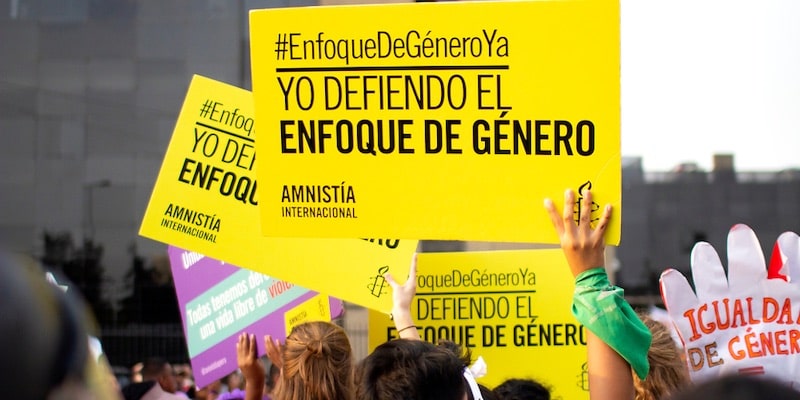We explain what is meant by “gender ideology” and in what context the term is used. Also, what is gender identity.

What is gender ideology?
“Gender ideology” or “gender theory” are terms with negative and pejorative connotations. employed by sectors of society that, to a greater or lesser extent, oppose the idea that the human race is an entirely social and cultural construction, arguing rather that the distinction between men and women has irremediably natural bases. Both positions are inserted in a complex contemporary debate around gender, in which social networks play a leading role.
In other words, The meaning attributed to “gender ideology” is that of the suppression of the differences between men and women ignoring even fundamental biological differences, to establish that in reality gender is optional and depends on people's self-identification, that is, on how they perceive themselves.
The concept “gender ideology”, thus, is contrary to that of “gender perspective”. The latter is supported by the majority progressive sectors that defend the need to review the way in which the distinction between men and women, the gender roles associated with each one, and the possibility of non-gendered genders exist until now in the West. binaries that break with this traditional conception of human sexuality. For the most progressive sectors, “gender ideology” simply does not exist
Those who affirm that there is a “gender ideology” accuse it of attacking human nature against traditional family values and even against culture itself. There are even those who claim that it is a cultural advance by certain political sectors to destroy the Christian religion or to impose a global tyranny.
The vast majority of these arguments are considered, however, as conspiracy theories, since they lack reliable evidence and are taken seriously only on social networks and in religious discourses.
Finally, there is no formal, scientific consensus regarding the existence or nature of a “gender ideology,” but there is a notable international militancy in matters of the “gender perspective,” that is, in the desire to construct a more egalitarian society in matters of sex and gender.
See also: Gender equality
Origin of the term “gender ideology”
Contrary to what is stated in some articles and social networks, the term “gender ideology” does not come from the progressive sectors of academia, nor was it coined by feminist or Marxist militancy during the 20th century. It is actually a term first used in 1995, during the Fourth World Conference on Women in Beijing, China, by Catholic authorities who took a dim view of the liberalization of certain issues regarding human sexuality, such as gender equality, homosexuality and the right to abortion.
In fact, in the Doctrinal Dictionary published in 2003 by the Pontifical Council for the Family at that time, it was announced that “gender ideology” is “a feminist idea” through which “women seek to liberate themselves” and it is proposed that “the “Heterosexuality, far from being obligatory, would mean nothing more than one of the cases of sexual practice.”
However, the term achieved its current popularity thanks to social networks and statements such as those made by Cardinal Robert Sarah, archbishop of Conakry, Guinea, who affirmed in 2016 the contemporary existence of “two diabolical forces: ISIS or the Islamic State, and gender theory. In recent times, However, this concept has been used and spread by neoconservative activists and thinkers especially in the United States and Latin America.
What is gender identity?
Gender identity is defined as the way in which an individual perceives themselves on a sexual and gender level that is, the place he assigns to himself within (or outside) the traditional distinction between men and women in society. This self-perception can match biological sex (and in that case we are talking about a person cis) or may not match biological sex (and in that case we are talking about a person trans).
For example, a person born male may identify as a female individual and perceive themselves as a trans woman. Or a person born female may perceive themselves as a male individual and identify as a trans man. In all these cases, the relationship that the person establishes psychologically and emotionally with their own gender constitutes their gender identity.
Differences between gender identity and sexual orientation
If gender identity is the psychological and emotional identification of individuals with themselves, Sexual orientation, on the other hand, is the general tendency of the individual regarding his or her erotic and romantic attraction.
That is, sexual orientation describes the type of people to whom someone is attracted: heterosexuals are attracted to people of the opposite sex, while homosexuals are attracted to people of the same sex and bisexuals to people of both sexes.
Sexual orientation has nothing to do, in principle, with gender identity A person can identify themselves as a man or a woman, and have a sexual orientation of one type or another: a man cis can be heterosexual, homosexual or bisexual, for example, in the same way that a man can be trans.
Gender equality
Gender equality is the goal to which gender perspective movements aspire, and consists of the parity of conditions between human genders, sexes and sexual orientations so that these do not influence the role that individuals play in society, their opportunities for success or the way they are treated by others. This gender equality radically opposes discrimination by sex, gender or sexual orientation in the work, civic, legal and medical spheres, among others.
Gender ideology in Latin America
Accusations of “gender ideology” in Latin America have grown hand in hand with the influence of social networks, just as in the rest of the West, and especially in those countries in which the Church and religion still have great importance in the formation of public discourse and state decision-making. In fact, in those regional governments with a conservative tendency, the term can be found in the description of state policies and in presidential addresses.
- Gender ideology in Argentina. Argentina is one of the countries with the most advanced legislation on gender issues in Latin America, with inclusion laws for people trans and the possibility of personal documentation for sexually diverse people. This does not mean that there are no opposing voices or that the term “gender ideology” is not used by groups opposed to the right to abortion, to legislation trans and the Argentine feminist movement, one of the largest on the continent.
- Gender ideology in Mexico. Mexico is a country with high rates of femicides and sexual crimes against women and especially women. transwhere the transsexual population did not have specific legislation until 2021, when the first laws were enacted that allow legal gender change from the age of 12, as long as they have authorization from their parents. Many local LGBTI+ social movements, however, consider this only the first step towards a Mexico that is more inclusive of sexually diverse people.
- Gender ideology in Brazil. The debate around the gender perspective in Brazil had an important highlight in 2014, when the debate began regarding education with a gender perspective in schools, something that critics of “gender ideology” denounced as “indoctrination.” ”. With the rise of conservative president Jair Bolsonaro in 2019, the evangelical and conservative religious sectors gained an important ally in their fight against what they consider to be an attack against the family and traditional values.
Continue with: Ideology
References
- “Gender Studies” on Wikipedia.
- “Gender ideology or gender perspective?” by Emmanuel Theumer in Página/12 (Argentina).
- “Gender ideology, a term to misinform about the rights of women and LGBTI+ people” in Animal Político.
- “Gender Ideology: tracking its origins and meanings in the current gender politics” by Sonia Correa at The London School of Economics and Political Science (United Kingdom).
- “Gender ideology” in the Glossary for Equality (Mexico).





